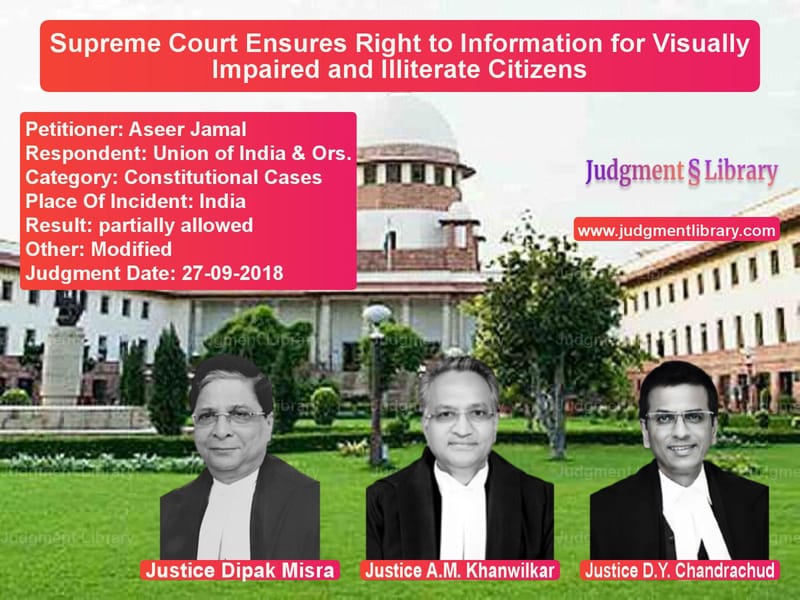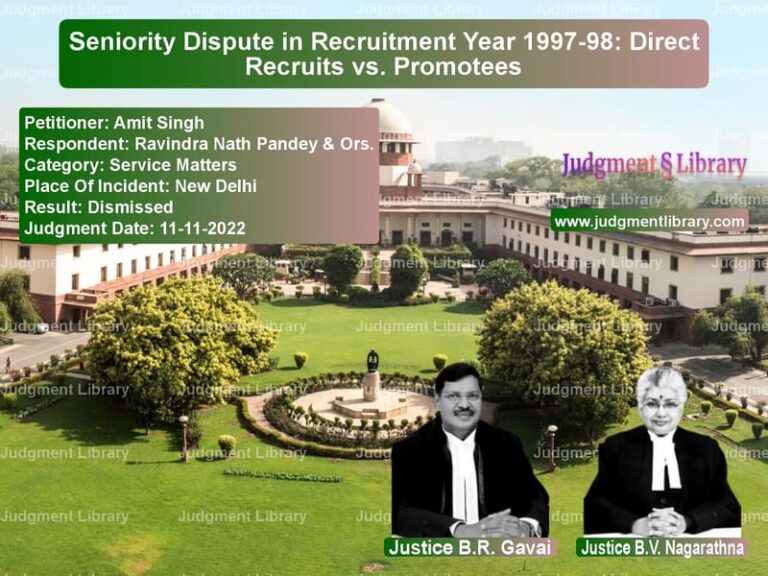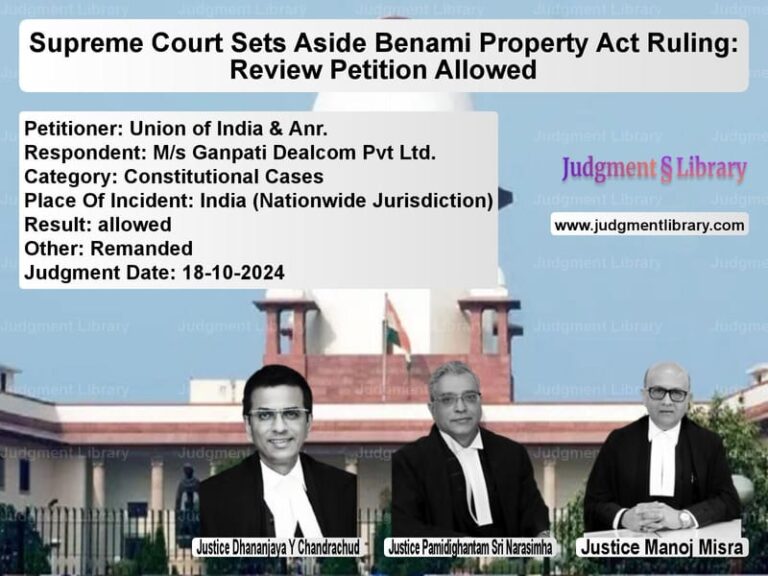Supreme Court Ensures Right to Information for Visually Impaired and Illiterate Citizens
The Supreme Court of India, in its judgment in Aseer Jamal vs. Union of India & Ors., reinforced the fundamental right to access information for visually impaired and illiterate citizens under the Right to Information Act, 2005. The case focused on ensuring that disadvantaged individuals, including those who are visually impaired or unable to access digital platforms, have equal opportunities to obtain information from public authorities.
Background of the Case
The petitioner, Aseer Jamal, filed a writ petition under Article 32 of the Constitution, arguing that the Right to Information (RTI) framework was not adequately accessible to visually impaired individuals, illiterate citizens, and those lacking internet access. He contended that such exclusion violated Article 14 (Right to Equality) and Article 19(1)(a) (Right to Freedom of Speech and Expression) of the Constitution.
The key concerns raised in the petition were:
- Illiterate persons and visually impaired individuals face significant hurdles in submitting RTI applications under Section 6(1) of the RTI Act.
- Many government websites and public authorities do not provide RTI access in Braille, audio formats, or assistive technologies.
- Citizens below the poverty line (BPL) and those without internet access struggle to obtain information.
- The existing mechanisms were not sufficient to ensure universal access to public information.
Provisions Under the RTI Act
The Right to Information Act, 2005 was enacted to promote transparency and accountability in governance. The Act provides every citizen with the right to access information from public authorities, subject to reasonable restrictions.
The relevant provisions discussed in this case included:
- Section 2(j): Right to Information – Defines the scope of access to public records, documents, and government data.
- Section 6(1): Request for Information – Requires an applicant to submit a request in writing or electronic form.
- Section 6(3): Transfer of Requests – Ensures that requests are forwarded to the appropriate public authority when needed.
Petitioner’s Arguments
The petitioner contended that:
- The RTI application process is discriminatory against those who cannot read or write.
- The lack of accessible formats such as Braille and audio versions of government notifications prevented visually impaired persons from exercising their rights.
- There was no comprehensive mechanism in place to assist BPL citizens who could not afford application fees or access digital platforms.
Respondent’s Arguments
The Union of India and other respondents, represented by Attorney General K.K. Venugopal, argued that:
- The proviso to Section 6(1) mandates public information officers to assist applicants in reducing oral requests to writing, which protects illiterate citizens.
- Several state governments already provide Braille documents and audio recordings for visually impaired applicants.
- Multiple helpline numbers and toll-free services were available to assist citizens with RTI applications.
- Citizens below the poverty line were exempt from paying RTI application fees, per Rule 5 of the RTI Rules, 2012.
Supreme Court’s Observations
The Supreme Court bench, led by Chief Justice Dipak Misra, Justice A.M. Khanwilkar, and Justice D.Y. Chandrachud, analyzed the concerns raised and made the following observations:
- “Access to information is a cornerstone of democracy and must be made available to all citizens, irrespective of physical limitations or economic status.”
- “Section 6(1) already obligates Public Information Officers (PIOs) to assist illiterate applicants, ensuring that no citizen is denied their right.”
- “States must proactively expand the use of Braille, audio files, and assistive technology to facilitate RTI access for visually impaired individuals.”
- “Public authorities should take necessary steps to improve the accessibility of RTI-related services through digital inclusion, free helpline services, and community outreach programs.”
Final Judgment
The Supreme Court issued the following directives:
- The government must enhance accessibility of RTI mechanisms for visually impaired individuals through assistive technologies.
- Public authorities must ensure that Braille and audio formats of RTI rules and procedures are widely available.
- RTI helpline numbers and toll-free services must be widely publicized to help illiterate citizens.
- State governments must introduce and promote mobile applications and localized RTI assistance centers for citizens without internet access.
- The petitioner was given liberty to submit further recommendations to the government for improving RTI accessibility.
Impact of the Judgment
This ruling has far-reaching implications for RTI accessibility in India:
- Ensuring Equal Rights: The ruling reinforces that all citizens, including visually impaired and illiterate persons, must have equal access to RTI.
- Technology for Inclusion: The directive to use assistive technologies highlights the Court’s commitment to digital inclusion.
- Government Accountability: The Court emphasized that public authorities must actively work to ensure that the RTI Act is not merely a legal provision but a functional tool for transparency.
By making RTI mechanisms more accessible, the Supreme Court reaffirmed the fundamental right to information as a key component of participatory democracy.
Petitioner Name: Aseer Jamal.Respondent Name: Union of India & Ors..Judgment By: Justice Dipak Misra, Justice A.M. Khanwilkar, Justice D.Y. Chandrachud.Place Of Incident: India.Judgment Date: 27-09-2018.
Don’t miss out on the full details! Download the complete judgment in PDF format below and gain valuable insights instantly!
Download Judgment: Aseer Jamal vs Union of India & Ors Supreme Court of India Judgment Dated 27-09-2018.pdf
Direct Downlaod Judgment: Direct downlaod this Judgment
See all petitions in Fundamental Rights
See all petitions in Public Interest Litigation
See all petitions in Constitution Interpretation
See all petitions in Judgment by Dipak Misra
See all petitions in Judgment by A M Khanwilkar
See all petitions in Judgment by Dhananjaya Y Chandrachud
See all petitions in partially allowed
See all petitions in Modified
See all petitions in supreme court of India judgments September 2018
See all petitions in 2018 judgments
See all posts in Constitutional Cases Category
See all allowed petitions in Constitutional Cases Category
See all Dismissed petitions in Constitutional Cases Category
See all partially allowed petitions in Constitutional Cases Category







